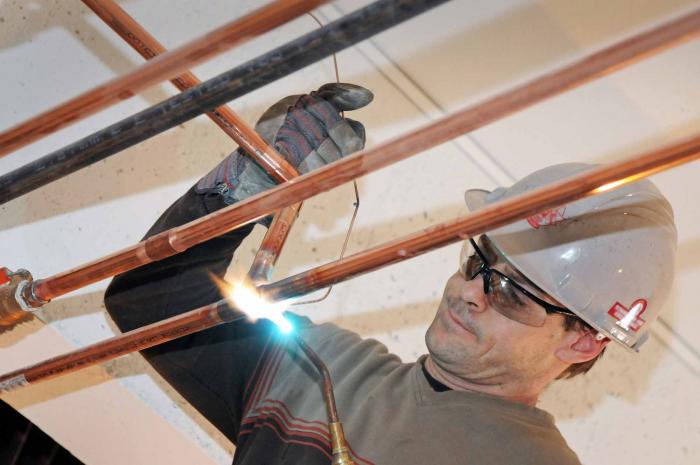
About
Ask yourself...
- Are you looking for on-the-job variety?
- Do you like working with your hands and machines?
- Are you disciplined and precise?
- Can you visualize detailed structures from drawings?
- Do you like dealing with people?
If the answer to these questions is yes, then a career as a Plumber could be right for you.
Plumbers install, repair and maintain pipes, fixtures and other plumbing equipment used for water distribution and waste water disposal in residential, commercial and industrial buildings.
They are employed by construction companies, plumbing contractors and maintenance departments, or they may also be self-employed.
Duties
As a Plumber, your duties may include:
- Installing, repairing and maintaining domestic, commercial or industrial plumbing systems
- Marking positions for pipe connections and fixtures in walls and floors
- Cutting openings in walls and floors to accommodate pipes and pipe fittings
- Measuring, cutting, bending and installing pipes using hand and power tools
- Joining pipes using clamps, screws, bolts or cement
- Welding pipes
- Testing pipes for leaks
- Preparing cost estimates
- Reading and interpreting blueprints
Work Conditions
The standard work week for plumbers is 40 hours (8 hours a day, 5 days a week). As with many careers in construction, there are peak periods that will require you to work overtime. The number of additional hours you work each week depends on the construction sector and region you work in, and will vary from one job to the next.
As a Plumber, you may work outdoors and indoors, alone or with a team of other construction professionals. The work can be physically demanding – you may have to stand or crouch for long periods of time, and you may have to lift heavy materials.
As with all careers in the construction industry, safety is the top priority. Plumbers are trained to work safely and take special precautions to protect against injury.
Training and Certification
Apprenticeship
Apprenticeship involves both classroom studies and on-the-job training under the supervision of a certified Plumber, called a journeyperson.
As an apprentice, you earn while you learn and are paid by the hour while working on the job site. Wages start at about 50 per cent of a journeyperson’s hourly rate and increase during your apprenticeship until you reach the full rate.
Entering an apprenticeship program
Requirements for plumber apprenticeship programs vary across Canada. In most provinces and territories, you must be at least 16 years old and have a Grade 12 education or equivalent to enter the program. You must also have courses in math.
Some provinces and territories offer secondary school apprenticeship programs that allow high school students to work towards a career as a Plumber.
For more information, check out the apprenticeship section.
Program length
Apprenticeship training programs for plumbers vary across Canada, but generally involve four 12-month periods, including at least 6,000 hours of on-the-job training, four eight-week blocks of technical training and a final certificate exam.
Related work experience or completion of a plumber program at a college or technical institute can reduce the time required to complete your apprenticeship.
Certification
Certification is required in Alberta, British Columbia, New Brunswick, Nova Scotia, Ontario, Prince Edward Island, Saskatchewan and Quebec. It is available but voluntary in Manitoba, Newfoundland and Labrador, the Northwest Territories and the Yukon. Where certification is not available, it may be possible to study as an apprentice through your local labour organization. Even where certification is voluntary, it is still recommended as it tells employers and other workers that you are a skilled professional, and it also helps you get jobs.
To be certified as a Plumber, you usually need to complete a four-year apprenticeship program. Once you successfully complete the required on-the-job training, technical training and exams, you are awarded a journeyperson certificate.
You may be eligible for certification in some provinces and territories if you have more than five years of construction experience and some high school, college or industry courses in plumbing.
As a certified Plumber, you may write the Interprovincial Exam to qualify for the Interprovincial Standards’ Red Seal. With a Red Seal, you can work as a Plumber anywhere in Canada.
To keep their skills current, Plumbers must keep up with new technologies by reading and speaking with others in their field.
Courses
Anticipated In-Demand Regions
- British Columbia
- Newfoundland and Labrador
- Nova Scotia
- Ontario - Eastern Region
- Ontario - Greater Toronto Area (GTA)
- Ontario - Northern Region
- Prince Edward Island
- Saskatchewan
Wage
 | ||
| Mid range $62,400 |  | High range $86,010 |
The “mid range” wage is based on the national “median” wage reported in the Job Bank career profile for this National Occupational Category (NOC): 7251
Note: Some career profiles may have more than one NOC code associated with them.







